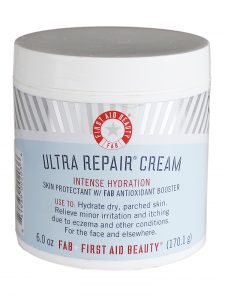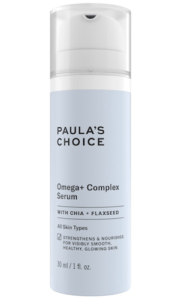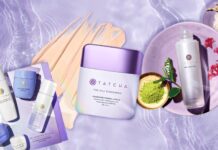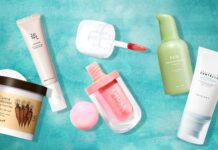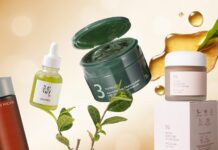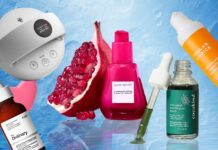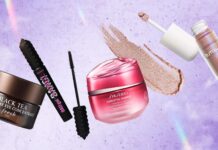
Sensitive skin can happen to anyone and at any time. When you have sensitive irritated skin, your skin barrier function is compromised, which means it doesn’t work the way it should.
A closer look at your skin
Think of your skin as a brick castle that protects you from intruders while keeping all the good stuff inside. This brick castle consists of dead skin cells (or bricks) layered on top of one another. You also have oils, ceramides, and fatty acids that help make up your skin. This waterproof and moisturizing paste fills up every crevice of open space between the skin cells. On a normal daily basis, your skin constantly works to keep away outside influences and factors like microorganisms from invading your body.
Moisture is important
At the same time, your skin also undergoes a process known as Trans-Epidermal Water Loss (TEWL) for short. This is different from sweating, which is caused in reaction to a temperature increase in your body. TEWL is a passive and near-automatic process that behaves with the air around you. To put it simply, your body releases water from your skin to the outside and evaporates. Depending on the environment, your body releases different amounts of water. If you live in a hot or damp climate, for example, you lose less water because there’s more water vapor in the air. In a cold or dry climate, however, you lose more water due to the lack of water vapor in the air.
Think of those times when your face felt dry and stiff during the winter. This is because there’s an excess amount of moisture evaporating away from your skin.
How to know if you have sensitive & irritated skin
Remember how we mentioned that irritated skin is caused by a compromised skin barrier? When there’s a lack of moisture in your skin, you’re weakening your skin’s defense mechanism. If you think about it… your skin barrier is creating holes in the glue that keeps the dead skin cells together.
Environment and chemical substances are very common reasons behind a compromised skin barrier. Cold and dry climates lead to higher TEWL levels, which can leave your skin feeling itchy, unpleasant, and stiff. Chemical substances such as alkaline based ingredients in your skincare products (most likely cleansers) can also dry out the skin. Then you have other outside influences like bacteria, allergens, wind, and even the sun that can cause an inflammatory reaction.
Another factor has to do with the internal body. If you have very sensitive irritated skin, your skin barrier is thin or has little to no lipids. And we all know that a brick wall can’t do its job properly if it has holes! To make things worse, there’s a chance for your immune system to go into overdrive. This is especially so when you come in contact with an irritant. Irritants are what makes your skin react negatively. Aging is also a factor that leads to a thin skin barrier because collagen and ceramide levels are gradually depleting as well.
How to treat sensitive & irritated skin
We have many factors that can lead to irritated skin. What can be done to treat it?
Moisturize inside and out
Yes, it sounds like a broken record when we tell you to moisturize but that’s the truth of it! Through TEWL, your skin can lose anywhere up to 1 pint or 473 grams of water throughout the day… even as we sleep! That’s why it’s important to keep your body hydrated as much as possible. Drink lots of water and focus on moisturizing your skin with ingredients that help trap moisture into the skin. The goal for a perfectly functioning skin barrier is to decrease TEWL levels after all!
Some moisturizing ingredients to look for
Humectants
Ingredients belonging under this category are known for pulling water from the air and into the skin. Many moisturizers fortunately carry lots of ingredients that do just the job. These ingredients include glycerin (or glycerol), hyaluronic acid (or its derivative sodium hyaluronate), honey, panthenol, propylene glycol, butylene glycol, and allantoin.
Emollients
Emollients soften skin and seal in moisture. They also act as a protective barrier for your skin’s surface, which is great for compromised skin. It’s like providing a makeshift shield while your actual shield is undergoing repairs. Like humectants, emollients are also present in many moisturizers. Examples of these ingredients include shea butter, cocoa butter, mineral oil, lanolin, paraffin, beeswax, squalene, coconut, jojoba, sesame, almond, and fatty alcohols like cetyl alcohol.
Ceramides and Lipids
If you haven’t noticed, ceramides and lipids are your body’s natural waxes to keep your skin lubricated, soft, and moisturized. These ingredients are also essential in keeping your skin barrier intact. When you have a compromised skin barrier, you actually have little amounts of ceramides and lipids to keep that barrier strong and sturdy. Therefore, stocking up on moisturizers with rich amounts of ceramides and lipids may help to rebuild that barrier.
Antioxidants
This is especially great for irritated skin because the sun can play a role in making skin issues worse. When you include antioxidant-rich serums in your routine, you can help reverse some of the barrier damage like acne and inflammation.
Avoid skin-sensitizing ingredients and allergen triggers
Everyone’s skin is different, which means that everyone has different triggers and sensitivities to certain ingredients. If you find that your skin is reacting negatively to a product, try to find the cause. You can do so by slowly removing products in your skincare routine until you can isolate one that causes sensitization. If it’s an allergic reaction, watch your diet and the environment.
Keep your routine to a bare minimum
This means ditching products containing active ingredients and layering on different serums and treatments at once. At this time, your skin is in a pretty rough state. If you continue to layer on different active ingredients, your skin is going to be highly reactive to the ingredient. Although that vitamin C serum works great for you, don’t expect your skin to behave in the same way. It’s possible to notice stinging and burning when your skin is super sensitive. Don’t worry though — it’s not the product’s fault. Put your serums and exfoliants aside and focus on cutting your routine down to the bare minimum essentials. This includes a good gentle cleanser, a good moisturizer, and sunscreen in the mornings. Continue using this routine until you notice your skin revert back to normal.
Product Recommendations
For more products we love, check out our article on New Skincare Finds for Sensitive Skin.
Missed our interview with Go-To Skincare’s Founder? Watch it below to learn more about sensitive and irritated skin!
Shop all of our curated faves at: https://bwth.in/shop
Subscribe to our YouTube Channel for more information and product recommendations: https://bwth.in/subscribe

